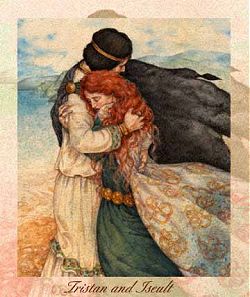 Had a bit of a popcorn dinner last night. We left the cinema too late for a proper meal.
Had a bit of a popcorn dinner last night. We left the cinema too late for a proper meal.Anyway, I'm not having any trouble getting to sleep these days. The combination of the World Snooker Championships and camomile tea is like a natural alternative to chloroform.
The quality of this film − the story, sets, performances, and overall dark age grittiness − fluctuates like a melody carried on the wind.
It's clearly not sure whether it wants to be Shakespeare, Tolkein or Robin of Sherwood. One very consistent note of excellence throughout though is Rufus Sewell as Marke; without him the sense of clunkiness would surely have predominated.
Sophia Myles (soon to be seen as Madame du Pompadour in Doctor Who and formerly Lady Penelope in Thunderbirds) is another fluctuator. Her Isolde is at once a feisty modern Irish lass and a shameless femme fatale. James Franco does an OK job as brooding Tristan, except whenever he's with her, when he turns into a kind of rigid, wet-eyed Cyberman. There's one very good set (Castle D'or) and the most is made of various Celtic landscapes.
Writer Dean Georgaris attempts to build our engagement with what is a rather weak political backdrop, a tale of savage Irishmen attacking a divided, yet multicultural post-Roman Britain. One of these savage Irishmen, Paddreggh (briefly Isolde's prometido) looks like Sir Anthony Hopkins after a bad case of steroid abuse. Isolde's handmaiden reminded me a bit of Mrs Doyle from Father Ted.
Up until now the version of this tale that I was most familiar with was Wagner's opera. It has often surprised me that there haven't been other cinematic attempts to tell what has to be one of the supperior pieces of native northern European mythology, but an awkward ending might be part of the problem. (Heroes generally don't die in fair combat with the villain.)
Georgaris has attempted to explain the mystery of why Tristan, a Cornish hero, has a Pictish name. He's also shifted away from Wagner's synopsis in a number of significant ways. Firstly, the couple are thrown together by fate and physical attraction leading to a romantic bond − and there's no sign of a love potion anywhere.
Then, Isolde is left alive when Tristan croaks (literally), only to be "disappeared" by some text running before the end credits. Perhaps Kevin Reynolds didn't think contemporary audiences would be up for the liebestod, the 'love-death'. (No room either for Iseult of Brittany and the white sail/black sail strand of the legend, and Melot is now Marke's nephew, not Tristan.)
Ridley Scott is one of the executive producers. It must have been him that laid on all the mist in the forest.

No comments:
Post a Comment